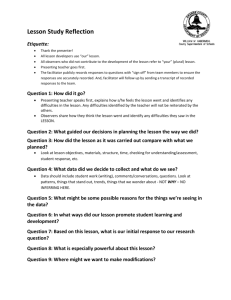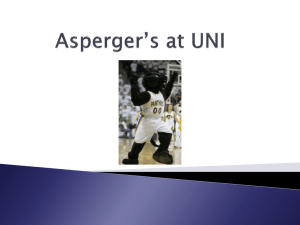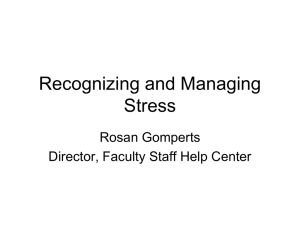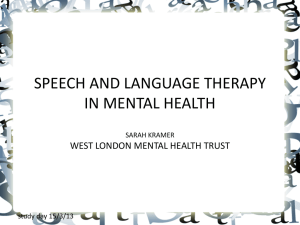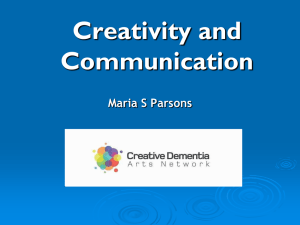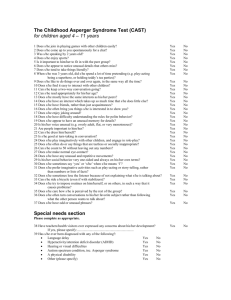Autism & Asperger's Checklist: Identifying Traits & Behaviors
advertisement
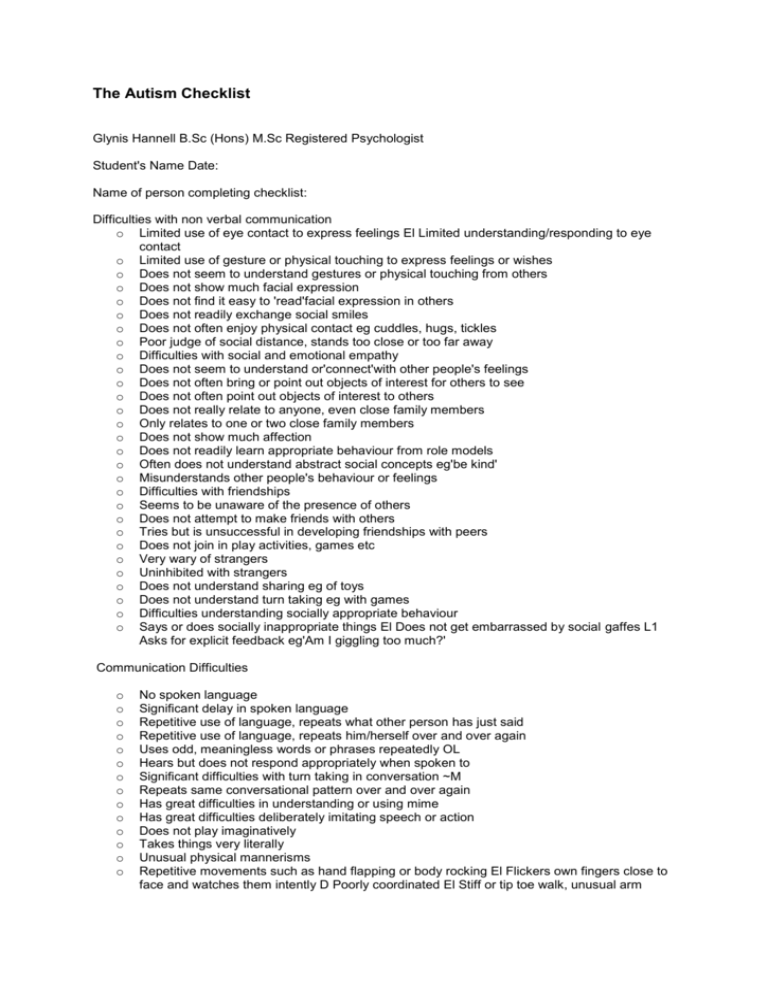
The Autism Checklist Glynis Hannell B.Sc (Hons) M.Sc Registered Psychologist Student's Name Date: Name of person completing checklist: Difficulties with non verbal communication o Limited use of eye contact to express feelings El Limited understanding/responding to eye contact o Limited use of gesture or physical touching to express feelings or wishes o Does not seem to understand gestures or physical touching from others o Does not show much facial expression o Does not find it easy to 'read'facial expression in others o Does not readily exchange social smiles o Does not often enjoy physical contact eg cuddles, hugs, tickles o Poor judge of social distance, stands too close or too far away o Difficulties with social and emotional empathy o Does not seem to understand or'connect'with other people's feelings o Does not often bring or point out objects of interest for others to see o Does not often point out objects of interest to others o Does not really relate to anyone, even close family members o Only relates to one or two close family members o Does not show much affection o Does not readily learn appropriate behaviour from role models o Often does not understand abstract social concepts eg'be kind' o Misunderstands other people's behaviour or feelings o Difficulties with friendships o Seems to be unaware of the presence of others o Does not attempt to make friends with others o Tries but is unsuccessful in developing friendships with peers o Does not join in play activities, games etc o Very wary of strangers o Uninhibited with strangers o Does not understand sharing eg of toys o Does not understand turn taking eg with games o Difficulties understanding socially appropriate behaviour o Says or does socially inappropriate things El Does not get embarrassed by social gaffes L1 Asks for explicit feedback eg'Am I giggling too much?' Communication Difficulties o o o o o o o o o o o o o o No spoken language Significant delay in spoken language Repetitive use of language, repeats what other person has just said Repetitive use of language, repeats him/herself over and over again Uses odd, meaningless words or phrases repeatedly OL Hears but does not respond appropriately when spoken to Significant difficulties with turn taking in conversation ~M Repeats same conversational pattern over and over again Has great difficulties in understanding or using mime Has great difficulties deliberately imitating speech or action Does not play imaginatively Takes things very literally Unusual physical mannerisms Repetitive movements such as hand flapping or body rocking El Flickers own fingers close to face and watches them intently D Poorly coordinated El Stiff or tip toe walk, unusual arm o o o o o o o o o movements when walking Very sensitive to some smells, textures, tastes D Unusually high threshold to pain or high/low temperature 1:1 Self injury, biting, picking, head banging Inflexible interests and adherence to routines Intense preoccupation with a specific object or topic eg keys, fires, ambulances, trains Distressed by small changes to routine T Adheres to unnecessary, meaningless routines eg must have bread cut in four squares Preoccupied with parts of objects Fascinated by spinning or flickering items Repetitive activities eg lining up toys in certain order over and over again Exceptional 'islands'of memory or skill Has extraordinary memory for some specific information eg train time tables 1:1 Has exceptional technical skill eg in music, although creative expression is lacking Using the Autism Checklist Each item that applies to the child or adolescent should be checked off. Even items that only apply occasionally or to a mild degree should be recorded. The more items which apply to a child or adolescent the more likely it is that they are autistic. However it is important to remember that several other conditions have similar characteristics and that specialist assessment is necessary for formal diagnosis. OPalmer Educational Publications 21 Palmer Lane North Adelaide South Australia 5006 The Asperger's Disorder Checklist Glynis Hannell B.Sc (Hons) M.Sc Registered Psychologist Student's Name Date: Name of person completing checklist: Poor social skills o Has few if any friends El Seems to find it difficult to read social situations o Makes inappropriate comments or does socially inappropriate things o Seems unaware or disinterested in peer group pressure o Often chooses solitary activities o Does not initiate or join in games with other children o Tries to make friends but is socially clumsy o Does not seek to share interests with others o Does not understand the moral in stories or films o Inflexible o Becomes very unsettled if something unexpected happens o Needs a lot of preparation if routine has to be changed o Does not really enjoy new experiences o Unwilling to try new foods, clothes etc o Does not enjoy surprises o Insists on sticking to routines that are unnecessary eg bread must be cut a certain way o Likes things in a certain order eg toys in order of size o Limited emotional understanding and unusual emotions o Seems to find it hard to understand how other people are feeling o Asks for explicit information about others'feelings eg 'Are you angry at meT o Seems'flat'and expressionless when strong emotion is called for o Gets very emotional over small issues o Gets very anxious when this is not warranted o Egocentric o Can only see things from his/her own point of view 11 Expects others to read his/her mind Difficulties with non verbal communication o Has poor eye contact (too little or too much) o o o Poor judge of social distance eg stands too close to others ls'wooden'when cuddled Does not always understand facial expression or gesture Finds it difficult to mime or to mimic others Restricted Interests o o o o Has an intense and prolonged interest in a topic eg trains, electrical circuits. Has a fascination for facts and figures eg timetables, street directories, dates Has a preoccupation with parts of objects, how things work Obsessed by a particular book or computer game Unusual language o o o o o o o o o Is very pedantic and'speaks like a professor' Has an odd accent , people think he/she comes from overseas Has unusual intonation eg speaks in a loud monotone Often talks non stop regardless of whether listener is interested or not Uses idiosyncratic, old fashioned or odd patterns of speech Speech is repetitive Takes things very literally Does not understand jokes, puns or metaphors Reads very accurately but comprehension of what is read is poor Poor coordination or unusual sensory awareness o o o Is physically clumsy Poor handwriting, immature drawing and untidy bookwork Unusually sensitive to textures of clothes or food , very sensitive to smells Unusual physical mannerisms o o o o Flaps or twirls hands Has an unusual gait such as stiff legged walk or exaggerated arm movements when walking Likes to run in a set pattern eg in circles or a particular route Runs on the spot, or twirls especially when agitated Using the Asperger's Disorder Checklist Each item that applies to the child or adolescent should be checked off. Even items that only apply occasionally or to a mild degree should be recorded. The more items which apply to a child or adolescent the more likely it is that they have Asperger's Disorder. However it is important to remember that several other conditions have similar characteristics and that specialist assessment is necessary for formal diagnosis. Reference Source: Glynis Hannell B.Sc (Hons) M.Sc Registered Psychologist, 2002 Identifying Children With Special Needs: Checklists for Professionals.Palmer Educational Publications 21 Palmer Lane North Adelaide South Australia 5006

